Do any live people ever realize life every minute while they live it? Saints and poets…and theatergoers… maybe… It’s time to take a step back, take a breath, and come celebrate the simplistic joys in life. The sunrising… the birds in the trees…the seasons changing… a new theatre company opening its doors for the very first time… Okay, that last one isn’t quite so simple, but Angelo Otterbein (owner and operator and art enthusiast of Manor Mill) and Vanessa Eskridge (director and producer of Manor Mill Playhouse’s inaugural production of Thornton Wilder’s Our Town) make it look simple, effortless, and easy. In partnership with the campus of Oldfields School, Manor Mill Playhouse takes you on a journey to Grover’s Corners…and while we may be living in 2024 in Monkton and Sparks-Glencoe… ‘north county’ as some call it…you’ll find that the quiet life of Grover’s Corners in Our Town is relatable and their little stories of their simple lives are suddenly all you can find yourself thinking about for two hours’ stage traffic.
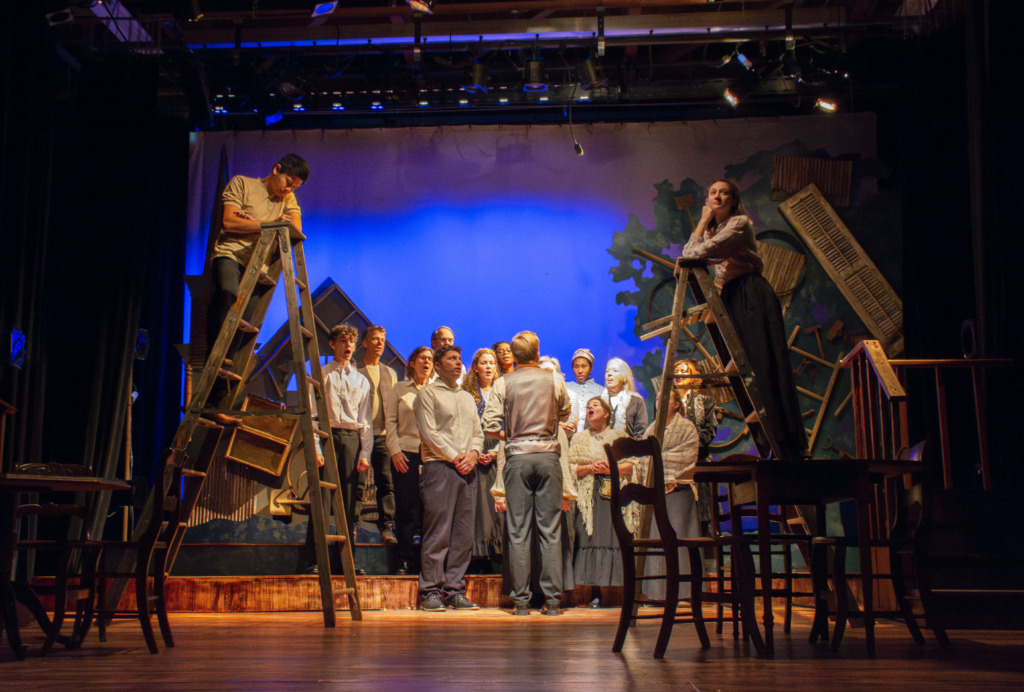
The American classic, the Thornton Wilder chestnut that is Our Town tends to set minds a dizzy when one thinks of sitting through some three-hour, duller-than-ditchwater, stuffy old still-life portrait of old-world Americana come to dance upon the stage. But Vanessa Eskridge and her clever production team and talented cast will have you looking at things a little differently once you view their production. And it’s not off-the-walls modern or set in some unfamiliar-but-conveniently-local time or place; it’s true to the text and yet invigorating. The most accurate word to describe it is charming. It’s simply charming and effervesces with this warm old-world nostalgia in a heartwarming but bittersweet fashion. It’s exceptionally well-paced, extremely heartfelt, and ultimately an extraordinary approach to what would otherwise be considered a tired, theatrical standard. There’s real heart behind it.
For a show that’s written without scenery, Scenic Designer Matthew Sean Mitchell flirts cheekily on the line of ‘designing a stage’ and ‘populating it with scenery.’ It’s part of what makes the show so charming. The apron of the stage inside The David Niven Theatre at Oldfields School has been gently draped with rustic old farming equipment (acquired from Angelo Otterbein of Manor Mill) and it primes the audience for the bucolic old world experience in which they are about to be steeped. These same pieces of farm machinery, barn siding, and other bits of antique rural detritus are scatter-plastered against a large upright frame of a church and a tree (two important-ish features) in the show’s scenic description; it continues that feeling of ‘tumbling into a world that time forgot’ as you see it ever-present in the background of the staging. Mitchell’s pièce de résistance is the floor. Yes, I said the floor. The polished, wood-grain, so-authentic-looking-that-it-will-bowl-you-right-over-to-learn-that-it’s-painstakingly-hand-painted stage floor. One could spend a good five minutes just marveling at the detailing of the floor.
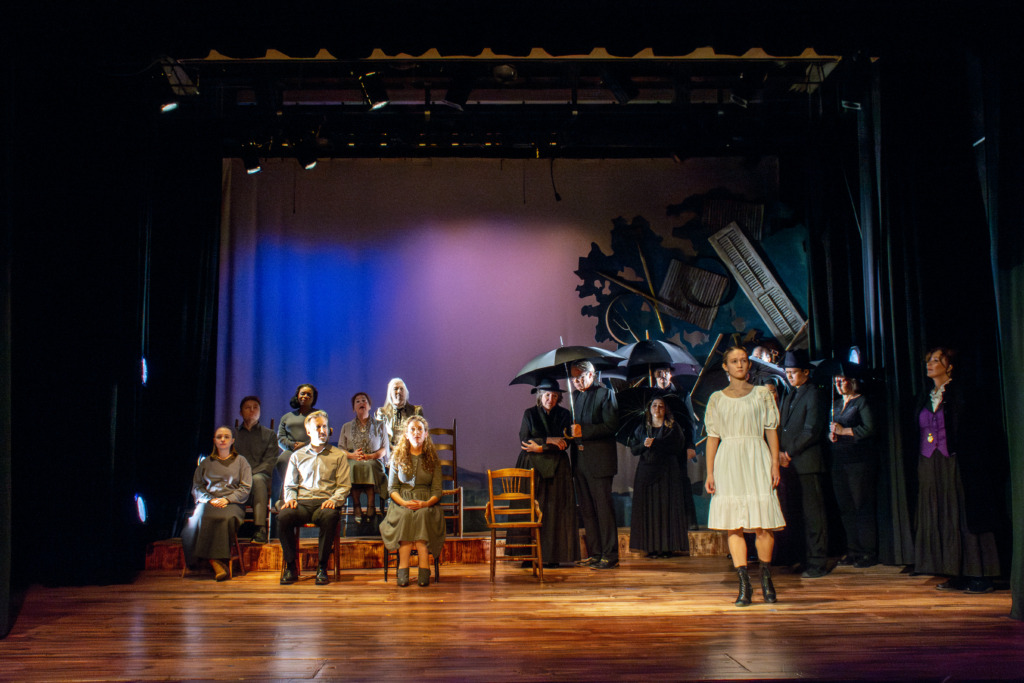
Drawing delicate attention to both Matthew Sean Mitchell’s design work and the performers as they mill about through the course of their daily lives, Lighting Designer Chloe Brush (who serves as the show’s actual stage manager, not to be confused with the character of the same title as written by Wilder for the purpose of the play) uses delicate warmth, subtle coolness, and a series of gentle colors that delicately hint at things like sunrise, midday, and moonlight. Brush’s lighting effects are meticulously focused. When George and Emily sit ascended at the pinnacles of their respective ladders (an oft-used staging trick to create upstairs bedroom windows) you get perfect lighting cues to highlight their figures in the ‘windows’ without washing them out or having them be garishly focused upon in what should reflect and feel like soft and natural ‘moonlight’, which it does. Rounding out the illusion of sunrise, nighttime, and quiet life in Grover’s Corners, Sound Designer & Board Ops Cory Richard Davolos augments both the lighting design and scenic work with perfect little instances of background sound. From the train pulling through the depot to the rain in the cemetery; Davolos’ sound engineering is perfectly balanced both in volume and precision execution. What’s truly marvelous (a combined effort between Davolos and Director Vanessas Eskridge) is the way the choir is utilized in the production. It’s so soft, so melodic and gentle, it almost sounds like it’s being piped in from a choir room down the hall (though you can actively see the company singing during ‘choir practice.) It’s hypnotizing in a lullaby-like fashion. The same too can be said for the quartet— especially when the close the production with a reprise of “Beautiful Dreamer.” (The Quartet— Cat Bustos, Greg Guyton, Paul Norfolk, Teagle Walker— also serve as characters in the performance but deserve an extra nod of praise for their pristine four-part blended harmonies.)
Knowing that the show takes place at the turn of the 20th century, Costume Designer Kim Melvin situates each of the characters in costumes befitting their station or profession. Much like the overall vibe of the production, it’s simple but eloquent and absolutely charming. The one exception to this notion is the almost ‘space-time-traveler’ vibes you get on Stage Manager from her velvet-detailed waistcoat and skirts. While still edging up against ‘period vibes’ you get this mystical verve from that particular sartorial selection, though it’s very, very subtle. Almost as if you’re not meant to know that the Stage Manager is removed from the timeline of events and exists simultaneously outside of the temporal and spatial reality of the play. It’s a cheeky wink at the omnipresent narrative role that the Stage Manager plays in Our Town without disrupting the carefully crafted aesthetic that’s been infused so thoroughly into the remainder of the play. One of the more striking costume visions that Melvin puts into place is for the ‘third and final scene’ which takes place ‘high on the hill’ overlooking Grover’s Corners…in the cemetery. Those departed of the world are dressed exclusively in grays— a physical representation of how they have faded from life itself. While the newest dead among them is dressed in stark white and the living come to mourn the recently deceased are all in bright blacks. It creates a wild image and I’ts thoroughly wondrous to look upon it.

How Director Vanessa Eskridge has managed to massage this cast of talented actors into this simplistic originating-slice-of-life drama in a fashion that makes it interesting and well-worthy of seeing is nothing short of theatrical brilliance and a stage miracle. Wilder’s narrative is duller than ditchwater, simple, ordinary stories that seem to mean very little and go no place very slowly. And yet, Eskridge and her cast has created a powerful performance— honing in on the earnest nature of these ‘daily lives’ of the folks in Grover’s corner, giving you this revitalizing approach to the timeworn tale— it’s virtually indescribable. You’ll find yourself melting right into their ordinary lives, yearning for simplistic times, and hanging on every word— whether it’s the descriptions from the Stage Manager or that resplendent scene shared by George and Emily at the drugstore soda fountain counter, the entire story feels new and intriguing, even for those that know it well and find it tedious. Pacing is everything and Eskridge, along with show-SM Chloe Brush, bear that in mind as they get this production on its feet. One moment flows fluidly into the next, just like the sands through the hourglass metering out the days of our lives. It all comes together— light, sound, performance, scenery, fluid movement— it’s a rare example of earnest, natural theatrical ingenuity existing in its simplest essence.
The cast, which in itself is a full ensemble of sorts, features the aforementioned quartet— Cat Bustos, Greg Guyton, Paul Norfolk, and Teagle Walker— as well as those who sing in the Choir— Aryah Fradkin, Kim Melvin, Barrett Pitcher, Katie Aiken Ritter— all lending mellifluous vocals to those delicately soft moments in song. Norfolk, of the quartet, doubles up as milkman Howie Newsome, and you find yourself piqued with curiosity when it comes to his appearances; the character is just space-chewing but so deeply invested does one find themselves in the ordinary lives of these ordinary people that even the ‘space-chewing’ characters are of interest. Teagle Walker, also of the quartet, is of a similar nature— you see him briefly as Joe Crowell the newspaper boy and his ‘weather-predicting’ leg but it’s a rich moment, however brief. April Herring is featured in a similar vein, arriving as Professor Willard, who may or may not be of the present Grover’s Corners timeline, but is an amusing little pip all the same, shuffling about with her books and notes to provide historical facts on the town.
The scene at the end of choir practice, which serves as the pinnacle of excitement for life in Grover’s Corners, features Louella Soames (Elizabeth Levy Malis) being the most gossip-driving, clucking-hen you could ever counter. Malis is so sincere in her attempts to gossip with Mrs. Webb (Carol DeLisle) and Mrs. Gibbs (M. Eden Walker) that you feel drawn to her tittle-tattle like whatever she’s gossiping about is the most important news you’ve heard all day. It’s also one of many extraordinary instances where Walker’s Julia Gibbs is vivaciously gushing over the simple joys of her life as if the moonbeams were her spirited soul bursting out of her eyes and her smile and her singsong voice with great glee. Other smalltown characters of note include Constable Warren (Ron Zyna) who has several minute interactions with various and sundry, reporting on this or that, and making you feel as if he truly does have the most exciting bit of real news to share. Simon Stimson (Matthew Sean Mithcell) is perceived in a similar way. His gentle staggering gait is both aloof and grounded, which brings out the pitiable feelings for his blighted character readily, even when the women and menfolk of the town find themselves whispering about him.
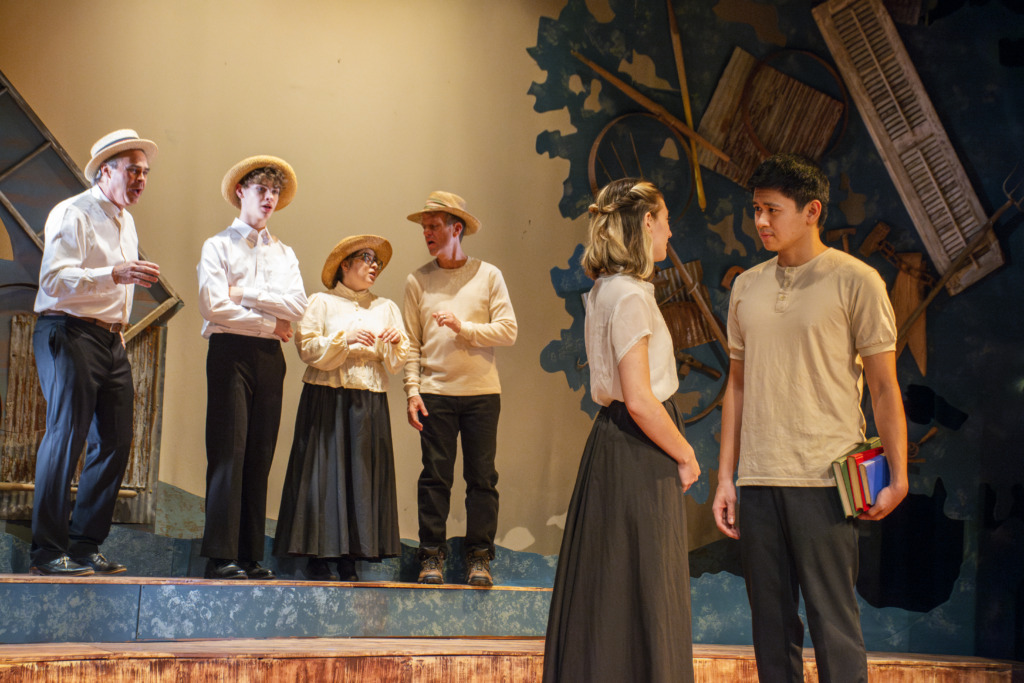
Our Town, in a sense, is the original ‘every-person’ story, but the focal point of the town— in addition to all the unseen characters that the Stage Manager calls reference to, and several whom the audience does physically get to see— revolves around Doc Gibbs (Mike Byrne) and his family and Editor Webb (Greg Guyton and his family.) And the mundane yet magnificent dynamic of day to day life in those families. Byrne, as the town’s good doctor, is simple in his portrayal, almost Roosevelt-like when addressing George about household chores and weekly spending money, but there is a truly striking moment when he bends down on the hill in the cemetery scene at the end; the moment is silent but extremely emotionally effective. Guyton, who doubles up in the quartet, is more jovial and lively, even when having more sober moments as the character of Editor Webb is wont to do. You get a series of cheeky expressions and live-wire explosions from Guyton during the discussion with George on marital advice, and a convivial fondness from him when he’s hollering up to his daughter in the bedroom window (the a-frame ladder) during the ‘moonlight-night-after-choir-practice’ scene.
Playing the younger of the Webb and Gibbs children respectively, Charlie Korman as Wally Webb and Kimmel Garner as Rebecca Gibbs, are just precocious, delightful and fit both the bill of professionalism in this production as well as the overall charming, simplistic nature achieved by this Manor Mill Playhouse production. Though Korman’s Wally has fewer speaking lines, he’s present whenever he’s featured. There’s a glorious enthusiasm about Garner’s Rebecca when she’s bursting at the seams to laugh at the curiously addressed postal letter, which reflects both an unrelenting joy from her character’s interest in the world and a sweet naiveté that is yet unfettered by the bonds of reality.
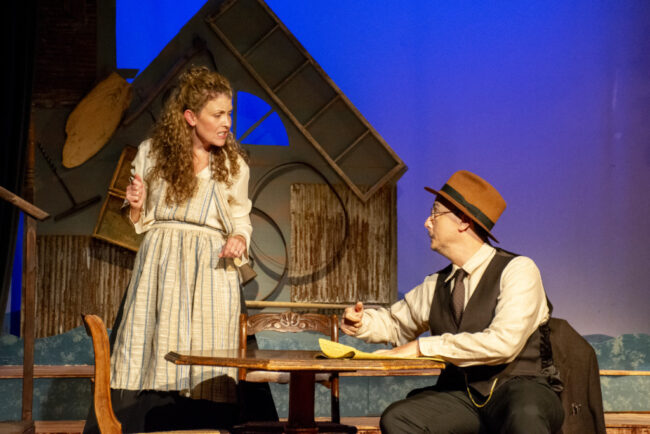
The wife folk— both Carol DeLisle as Myrtle Webb and M. Eden Walker as Julia Gibbs— are their own kinds of fascinating. Both DeLisle and Walker do a good deal of ‘pantomime’ as they bustle around their respective kitchens and gardens preparing breakfast and the household for the day. When they’re seated together, stringing beans in Mrs. Webb’s garden, the camaraderie and tenderness with which that scene is approached feels so genuine it makes your heart ache for a time when everyone knew and was sororal with their neighbors. Walker, by demands of the script, has more lines, and is given more of a chance to be wholly enthusiastic, almost with an indefatigable glee about her that borders on being syrupy but is held in balance just so by her polished sense of being. Walker’s Julia Gibbs is so lively and engaged, it’s the perfect foil up against the fusty, stick-in-the-mud Doc Gibbs character. And to truly showcase her versatility as a performer, you get is a moment, both in the second act the morning of the wedding, and later in the third, more subdued act, where Walker’s character comes down from her gleeful high of living, creating a sharp contrast that is truly breathtaking.
Two young friends-come-lovers— George Gibbs (Marlo Lacson) and Emily Webb (Julia L. Williams) are the microcosm of focus inside the pinnacle point of the Gibbs-Webb circle that is Our Town. Both give extraordinary performances with exceptional consistency throughout the production. Lacson in particular, who is as rooted in his character’s journey as he is gently drifting above the reality of his character’s feelings, has you hanging on his every moment, particularly when he gets into that discussion with Emily about noticing people and things and behaviors. The whole drugstore soda fountain counter exchange is delivered from such a place of raw, unapologetic honesty that you really feel like you’re living in the moment and sharing those feelings with them. It’s remarkable. You get a drastic shift in William’s character portrayal in the third act, where the chipper, albeit forward, young lady turns into something far more somber, sober, and even a bit harrowed by her own self-discovery. Watching her moments interacting with George are a true treat; watching her re-watch and relive moments of life in the third act sets forth a growing, unsettling pain in both the heart and soul.
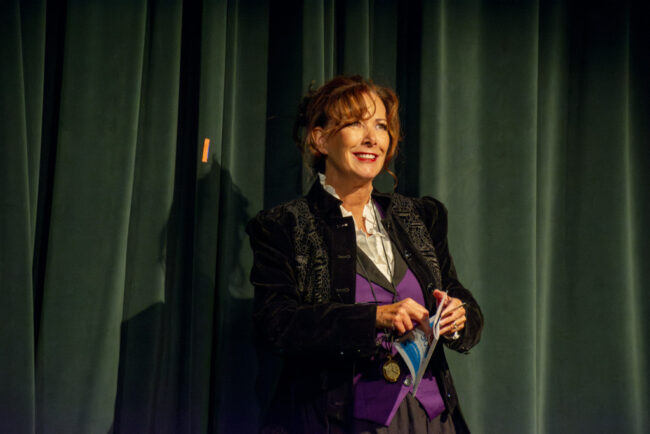
And it all lands on the ears of the audience by way of the Stage Manager— played with a delicately balanced effervescence by Michele Guyton. There is this lingering sense of melancholy about Guyton’s portrayal but it’s not unwelcome; it feels realistic and grounded with intention. Even when she points out the beauties of simple life, there is a sadness, cloaked with a gentle smile in her eyes, in her voice, and on her face that keeps her narrations impeccably balanced. She isn’t there to spin a story, she isn’t there to change your mind, she’s simply there to open the portal to a different era, letting you see life for what it was, and she does so without ever losing your attention, letting your mind wander, or drift off. And her ability to visually paint the scenes with her descriptive delivery of Thornton Wilder’s words is astonishing. Guyton presents layers of effortless nostalgia, gently guiding the story back and forth in time, as if she were perhaps time itself unwinding, unraveling, and replaying for all of us to enjoy.
It’s truly a gem of a production, quaint and charming and eagerly awaiting audiences of ‘north county.’ There is something eternal about it, even though it’s only running for four performances. And you won’t want to miss viewing it; you’ll have missed something truly special if you do.
Running Time: Approximately 2 hours with one intermission
Our Town marks the inaugural production of Manor Mill Playhouse and plays October 18th, 19th, and 20th 2024 in The David Niven Theater at Oldfields School— 1500 Glencoe Road in Spark-Glencoe, MD. Tickets are available at the door or in advance online.
